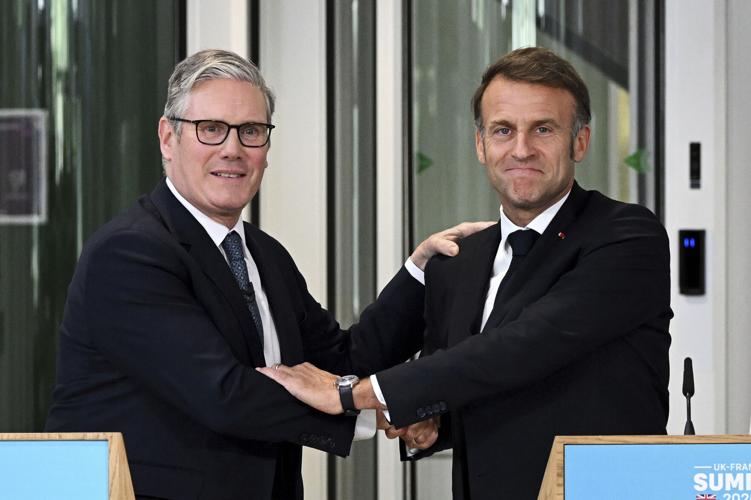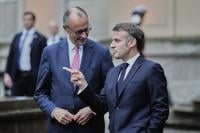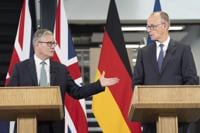LONDON (AP) — The leaders of Britain, France and Germany will hold an emergency call Friday about the growing hunger crisis in Gaza, after French President Emmanuel Macron announced that his country will become the first major Western power to recognize a Palestinian state.
The surprise announcement exposes differences among the European allies, known as the E3, over how to ease the worsening humanitarian crisis and end the Israel-Hamas war.
All three support a Palestinian state in principle, but Germany said it has no immediate plans to follow France’s step, which Macron plans to formalize at the United Nations General Assembly in September.
Britain has not followed suit either, though Prime Minister Keir Starmer on Thursday came closer than ever before, saying “statehood is the inalienable right of the Palestinian people.”
Starmer said he, Macron and Chancellor Friedrich Merz will speak Friday about “what we can do urgently to stop the killing and get people the food they desperately need while pulling together all the steps necessary to build a lasting peace.”
“The suffering and starvation unfolding in Gaza is unspeakable and indefensible,” said Starmer, who is under mounting pressure to formally recognize Palestinian statehood, both from opposition lawmakers and from members of his own Labour Party government. Health Secretary Wes Streeting on Tuesday called for an announcement “while there’s still a state of Palestine left to recognize.”
More than 140 countries recognize a Palestinian state, including a dozen in Europe. But France is the first Group of Seven country and largest European nation to take the step. Israel and the U.S. both denounced the decision.
Britain has long supported the idea of an independent Palestinian state existing alongside Israel, but has said recognition should come as part of a negotiated two-state solution to the conflict.
Any such solution appears far off. There had been no substantive Israel-Palestinian negotiations for years even before the Oct. 7, 2023 Hamas attack on Israel that killed 1,200 people and sparked the current war.
The worsening humanitarian crisis in Gaza, where hunger is spreading and children have starved to death, has caused alarm even among Israel’s closest allies.
Germany has traditionally been a particularly staunch ally of Israel in Europe, with relations rooted in the history of the Holocaust. It says recognizing a Palestinian state should be “one of the concluding steps” in negotiating a two-state solution and it “does not plan to recognize a Palestinian state in the short term.”
But Berlin, too, has sharpened its tone recently, describing the Israeli military’s actions in Gaza as unacceptable and pushing for greater humanitarian aid, but still appears to favor trying to influence Israeli officials by direct contact.
The German government said in a statement Friday that it is in a “constant exchange” with the Israeli government and other partners on issues including a ceasefire in Gaza and the need to drastically improve humanitarian aid. It said it is “prepared to increase the pressure” if there is no progress, but didn’t elaborate on how.
Britain has halted some arms sales to Israel, suspended free trade talks and sanctioned far-right government ministers and extremist settlers, but Starmer is under intense pressure to do more.
Labour lawmaker Emily Thornberry, who chairs Parliament’s Foreign Affairs Committee, said a majority of committee members supported immediate recognition of the state of Palestine.
“We’ve been in favor for 40 years of a two-state solution, and yet it’s been drifting,” she told Times Radio, saying Macron’s announcement should be a “kickstart” for the peace process.
Also weighing on Starmer is his desire to maintain good relations with the U.S. administration, which has strongly criticized France’s decision. The British leader is due to meet President Donald Trump in the next few days while the president is in Scotland visiting two golf courses he owns there.
Yossi Mekelberg, a Middle East expert at the international affairs think-tank Chatham House, said Macron’s decision to defer finalizing recognition until September “creates some space” for other countries to get on board.
“We know that the U.K. is close, but not there,” he said. “This might encourage Starmer, who we know is not one to rush such a decision. … This might create some momentum, some dynamic, for the U.K.”
Associated Press writer Geir Moulson in Berlin contributed to this story.







